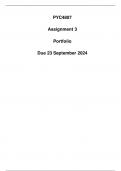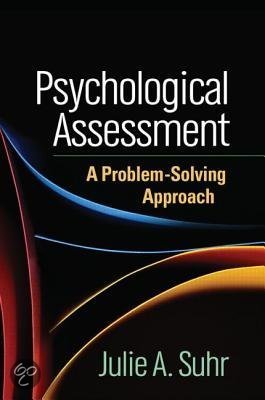PYC4807
Assignment 3
Portfolio
Due 23 September 2024
, Section 1: Psychological Assessment in Real-Life
Question 1
a) The context selected for this exploration is the educational domain, particularly
focusing on the assessment of learning difficulties among primary school children. I
explored a real-life situation involving a family friend whose 8-year-old daughter, Sarah,
faced challenges in reading and mathematics. Concerned about her academic progress,
the teacher recommended a referral to the school’s educational psychologist. Through
observational interactions during parent-teacher meetings and conversations with the
involved educators, I learned about the school’s systematic approach to addressing
learning difficulties, including the use of standardized assessment tools and tailored
interventions to support struggling learners.
b) To gather information about this context, I engaged in several methods. First, I
conducted informal discussions with my friend about her daughter's academic
experiences and her interactions with the school staff. Additionally, I attended a parent-
teacher meeting, where the school’s educational psychologist addressed the process of
referring students with learning difficulties. This meeting provided insights into the
specific assessments used, such as cognitive ability tests and achievement tests, and
how these assessments informed intervention strategies. I also consulted educational
materials on psychological assessments applicable in school settings to enhance my
understanding of the theories underpinning these practices.
Question 2
a) Chapter 15 of the prescribed book and Theme 3 of Tutorial Letter 102 emphasize that
the primary aim of psychological testing in educational settings is to identify students
who experience learning difficulties and to develop individualized learning plans. Such
testing also facilitates early intervention, enabling educators to modify learning
environments to better accommodate diverse learning styles and needs, ultimately
enhancing educational outcomes.
b) In the situation explored, Sarah was the child tested, and the referral to the
educational psychologist was made primarily due to her noticeable struggles in reading
and mathematics, which raised concerns about a possible learning disability.
Educational psychologists, who are specialists trained in assessing learning and
developmental issues, administered the tests, including the Wechsler Intelligence Scale
for Children (WISC). After the assessment, feedback was communicated to Sarah's
parents in a meeting where the psychologist shared findings, discussed Sarah's
cognitive strengths and weaknesses, and recommended strategies tailored to her
learning style, such as specialized tutoring sessions focused on literacy.





